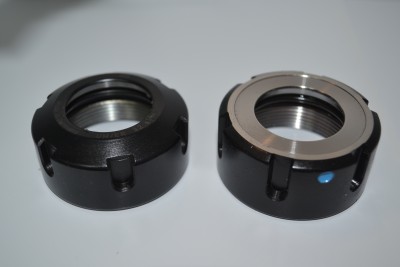The Importance of Ball Bearing Collet Nuts on HSK/ISO Tool Holders

The importance of a ball bearing in the collet nut cannot be understated. Apart from the fact that it allows the user to run both CW and CCW tools in the same tool holder, it is the solution to eliminating tool slippage problems during the routing process. Even if tool slippage is not an issue….if you are noticing any collet marks on the shanks of used tools, you have an issue with vibration occurring during the cut. This leads to poor cut quality and poor tool life. While these collet marks can also result from a worn collet needing replacement, they often occur from use of a static nut that doesn’t apply the same grip as a bearing nut does.
Case in point: One Florida customer, lets call him “Carlos”, bought two 1/2″ diamond PCD router bits from GDP and experienced breakage of both bits right below the shank. When the PCD bits were returned for evaluation, we found chattering to be the problem and upon further investigation, found his tool holder had a static nut and a collet which had not been replaced in years. After replacing the tool holder, collet and diamond bit the customer called a few weeks later to tell us his problem was resolved and better yet, his CNC machine had never ran as quietly as it was now running, in all the years he had owned it!
At the CNC Cookbook they have studied the effects on precision that come with and without a ball bearing collet nut – the results tell the story on just how important the ball bearing is “…A ball bearing nut has about 14% more static stiffness for surface finish, but a whopping 50% more damping, which helps keep the chatter out when you have to get aggressive with a cut.” If you’re serious about precision and interested in getting new tool holders, or upgrade to ball bearing collet nuts, you can call us at 1-800-544-8436 to order.
